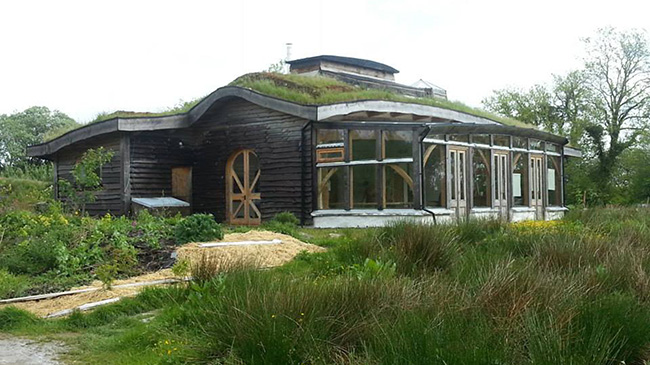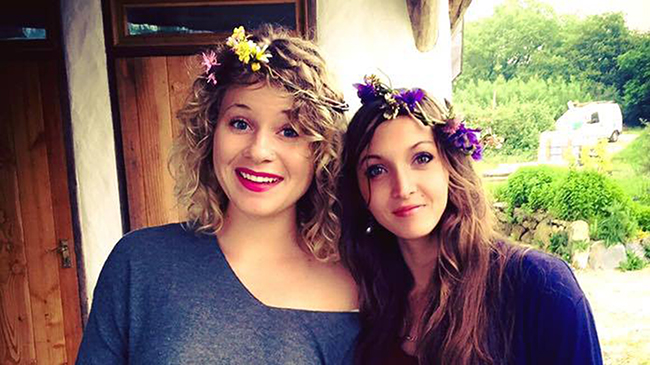By Steven Krolak
Sometimes, you have to go back to move forward.
That’s the basic idea behind P454 Field Research in International Psychology. The course, taught by psychology professor Dr. Lucinda Woodward, addressed the question: What can one do as an individual to make a difference in the crisis facing our global ecology?
To find answers, the 14 adventurous IU Southeast students enrolled in the course traveled to rugged West Wales last summer for a two-week immersion in Stone Age religion, environmental psychology and sustainable living.
The central “classroom” was the Lammas EcoVillage, one of Britain’s pioneering sustainable living facilities and a model teaching site for permaculture, integrating land use, dwellings and natural systems. From straw-bale construction and passive-solar energy to soil rehabilitation and communal land use, Lammas is a living laboratory of low-impact approaches to basic survival challenges that point the way to a green future.
The students’ days at Lammas were filled with instruction and field activities in areas ranging from bee keeping and foraging to organic farming and non-fossil energy systems. Evenings were devoted to structured journaling, presentations, media and group discussions.
On weekends they braved the chop to observe dolphins at a coastal conservation area, explored Stonehenge and the Roman spa town of Bath, and shadowed the residents of Brithdir Mawr, one of the first planned sustainable communities in Wales, where a number of families live and farm completely off the grid.

The Hub at Lammas EcoVillage, a low-impact structure that demonstrates the theory and practice of green design.
At the end of their stay at Lammas, the students split up into smaller groups. One traveled to Ireland to explore the ancient roots of Celtic nature worship at the Stone Age temple of Newgrange, consecrated to the cycle of the seasons. The other ventured to Paris, France, to witness the future being born in a city that has decided to adopt green planning and return many streets to pedestrians after a century of automotive dominance.
For the students, stripping away layers of technology and getting down to ancient truths was cathartic and empowering.
Cara Bareis is a psychology major from Louisville, Ky. She plans to attend graduate school and was eager to pursue actual scientific research. She was grateful to spend time collecting data on everything from group dynamics and the conservation of open farm land to Iron Age resource use and the importance of bees to the global food web.
“I believe people need to think about exactly what we are doing to the planet on a smaller scale,” she said. “By simply composting by-products or turning off your Wi-Fi at night to conserve energy, you can begin to see that you make a difference.”
Janet Saborsky, like Bareis a psychology major from Louisville, Ky., envisions working with the Peace Corps in Africa. Inspired by the way the Lammas EcoVillage had become an accepted and important part of the surrounding rural community, she draws lessons for her own life.
“I have learned that the only way that I will be able to make a difference is to make those changes myself, and to show others how even the simplest actions can mean something,” she said.
While most colleges offer overseas experiences of some kind, IU Southeast tailors international travel options to coursework and specific curriculum goals in biology, education, psychology and history. This past year, students pursued field study in Costa Rica, surveyed biological diversity on the Amazon River in Brazil, uncovered artistic traditions in Samoa, encountered the ethnic and cultural diversity of Ecuador, and walked in the footsteps of the ancient Greeks in Southern Italy and Sicily. New trips are planned to Ireland, Australia and New Caledonia for 2016.
“The opportunity to travel, make international connections, experience a new lifestyle, self-reflect on the collective and individual mistakes of the past, and take away tangible lessons for the future on living at one with the earth is only possible through a study abroad experience of this sort,” Woodward said.
“I believe IU Southeast is the only IU campus teaching an immersion-based learning course on environmental psychology and sustainable living,” Woodward said. “Sitting in the classroom or going online to expose oneself to the concepts of ecology and permaculture is one thing. Living a truly green life – eating, working, cleaning green – is truly a unique experience that only we can offer.”
Of course, study abroad isn’t all about work, it’s also about being open to the unexpected, discovering something new, sharing one’s own culture with those you meet.

IU Southeast psychology students Emily Kuprianczek and Deidra Miniard prepare for Twmpath, a traditional Gaelic music and folk dance celebration.
For this group, number-crunching debates over carbon footprints and carrying capacity blended seamlessly with the humming of bees, the blast of sea spray and the echoes of ancient Celts to create a transformative learning experience.
“I have a whole new perspective on how we view the world in which we live,” Saborsky said.
For information on study abroad opportunities through IU Southeast, contact Dr. Lucinda Woodward, director of international programs by phone at 812-941-2365 or by email at luwoodwa@ius.edu, or Dr. Valerie B. Scott by phone at 812-941-2502 or by email at vbscott@ius.edu. For information on over 100 study abroad options available through Indiana University, please visit www.overseas.iu.edu.


